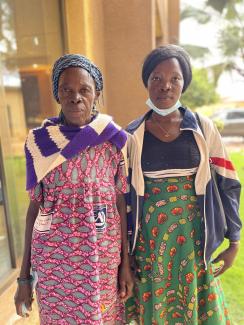Burkina Faso is facing unprecedented levels of insecurity as organized armed groups (OAGs) operate within the country with increasing mobility. Currently, an estimated 60% of the country is controlled by these OAGs, and 1.9 million people fleeing violence have been displaced from their homes and communities.
As these internally displaced people (IDPs) find refuge in villages and towns where the security situation is better and less volatile, these sudden population increases put tremendous pressure on already scarce resources such as water, land for agriculture, and food commodities. This further increases the vulnerability of IDPs and their host communities, while also contributing to tensions between the two groups.
To address this, USAID’s ASTER activity increases the resilience of vulnerable people by helping them secure land through official channels. We define resilience as the ability to plan for, go through, and bounce back from hardship. Secure land ownership is something that contributes to people’s resilience in part because it reduces their vulnerability to events such as natural disasters.
By working directly with landowners, ASTER allows vulnerable people, IDPs, women, and youth to rent or even be given a piece of land. This is particularly important as most people in Burkina Faso earn their living from agriculture.
This is the case for Bibata, who lost her husband and oldest son when OAGsattacked her village, killing more than 30 people and burning down the local market. After finding refuge in a neighboring village, she could not secure land to farm to provide for her livelihood.
One day, Bibata attended a presentation by ASTER about the importance of land ownership and the process of securing it with local authorities. This resonated strongly with Bibata, who was struggling to make ends meet. Together with the ASTER team, she discussed with the village's traditional leader and landowners and was granted an unused plot of land. Now Bibata uses this land to grow cowpeas, millet, sorghum, okra, and sesame with the aid of the eight other members of her family. Her harvests allow her to feed her family and improve the nutritional quality of their meals.
"Today, I feel relieved because I have become a landowner in the village of Zablo,” explains Bibata. “My land provides me security as a woman and displaced person, and allows me to produce in greater [quantity] without worries, and provide for my family."
Over its three years of implementation, ASTER, a $2.9M Feed the Future initiative funded by USAID, will assist 24,000 people like Bibata in 27 communes of Burkina Faso.
“Given the security situation, the displacement of populations can often lead to land-related problems,” says Bibita. “Now, with the demarcation of my farm, I am sure not to trespass on my neighbor's field and vice versa. This will avoid unnecessary conflicts and facilitate cohesion between us for a long time.”

USAID Aster/ONF-BF
